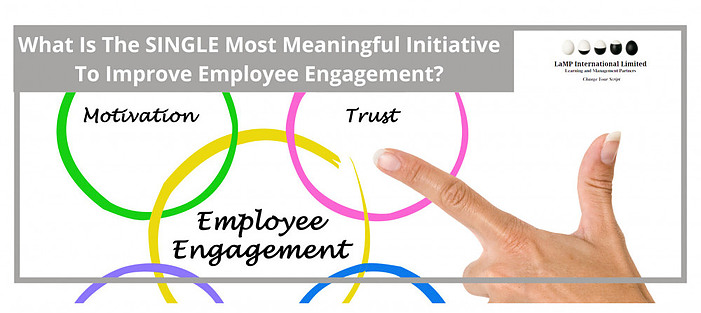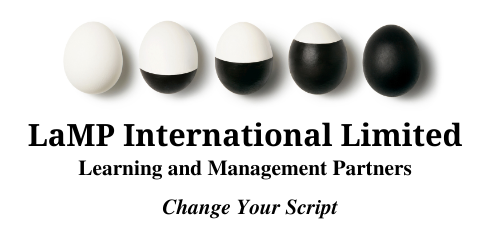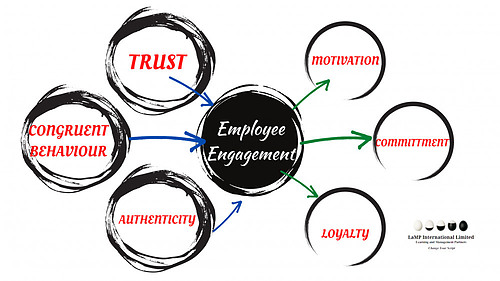
I find it hard to believe that it is still necessary to talk about the single most meaningful initiative to improve employee engagement.
However, if you are reading this article it is because you are searching for an answer. Or, the answers that you have found still do not tell you what that single, most important initiative is.
With all the theories, statistics and information out there – 203 MILLION results on Google Search alone – you would think that getting this specific question answered would be easy, wouldn’t you?
So, why is it so hard to get your question answered precisely?
Well, let’s not waste any time and get to the bottom of it, shall we?
Here Is The Single Most Meaningful Initiative To Improve Employee Engagement
The single most meaningful initiative to improve employee engagement is TRUST. Professor William Kahn of Boston University first coined the term in 1990 in his theoretical publication, “Psychological Conditions of Personal Engagement and Disengagement at Work“. Although, the first employee attitude surveys were conducted in industrial companies in the 1920s. One hundred years later, the human element of this important organisation development tool seems to have been neglected.
In theory and when stated simply, employee engagement looks like just common sense. The theory tells us that managers and leaders in an organisation must ensure that their employees are fully engaged. If they are fully engaged, chances are that they will be motivated to do their jobs and do them well, most of the time.
That is the goal of employee engagement. How hard could it be if all it takes is common sense?
Well, as it turns out, that is not all or what it needs and it certainly is not the most important aspect of employee engagement. As with many of these theories, the fact that we are human and effective behaviour is critical for success has been placed on the lower rungs of the ladder.
Let me simplify it further.
What Does Employee Engagement Mean?
Employee engagement means engaging with your employee.
According to the Cambridge dictionary, to engage means to:
- employee someone,
- interest someone in something and keep them thinking about it,
- become involved or have contact with someone,
- teach someone or keep them busy,
- attack or begin to fight an enemy (usually in a military operation).
I am certain that number 5 made you smile, laugh or utter a big “hhmmmm“.
For many of us, employee engagement within our organisations feels like we are being attacked. Things are thrown at us from all different angles and levels of the organisation.
Surveys are rolled out at a pace. Yet, like the proliferation of technology, the more that is thrown our way, the more distant and unengaged we feel and the more demotivated we become.
Why is that?
It is because we have lost the essence of what employee engagement is. To become reacquainted with that essence, we have to remind ourselves that, theories and surveys aside, we are still humans.
What Are Employee Engagement Initiatives?
Employee engagement initiatives are usually implemented as part of a broader organisation development strategy focusing on improving employee performance. The objectives centre around developing employees and keeping them happy at work.
Examples may include:
- surveys to find out what is working well and what may need to be improved,
- rewards for top performers, for example, airline tickets for meeting your sales target,
- structured career pathing to provide opportunities for promotion and growth,
- being recognised as the Employee of the Month or,
- being rewarded for a cost-saving initiative with tickets for dinner and a movie.
Companies may budget for these initiatives or they may choose to wait for employees to request them. Some initiatives that we may take for granted such as Sports Clubs and birthday contributions are also employee engagement initiatives.
These may be funded by the organisation, employees or both.
RELATED > > > What Is The Fastest Emerging Trend In Organization Development In 2022?
Why Is Trust The Single Most Meaningful Initiative?
Now, you have a better understanding of what employee engagement means and the tools you can use to improve it. But these are exactly that, tools.
Something is still missing and that is TRUST. It is, by far, the SINGLE most meaningful initiative to improve employee engagement.
Think about it while I ask you this question.
If you do not trust your environment or the people in it, would you be motivated to contribute more than you have to? Would you be willing to stay for the medium to long term? Or would you start Quiet Quitting or maybe seek other opportunities?
Most organisations miss the mark completely when it comes to employee engagement and what is important. Instead of jumping into surveys and group-hugging Kumbaya events, it is critical to establish TRUST within your organisation.
This requires managers and leaders to be authentic and to behave congruently.
RELATED > > > What Is Congruent Behaviour? How To Live Authentically
Why Is Trust So Important For Employee Engagement?
In 2016, Quantum Workplace’s Employee Engagement Trends Report revealed that management and leadership are one of the most important drivers of engagement in an organisation.
Four years later, in their research, Deloitte revealed that over 60% of employees would stay with their organisations if they had a high level of trust in their company’s leadership.
According to Deloitte:
“A workforce is far more engaged and committed when it trusts its leadership, receives clear communications about corporate strategy and believes its leaders have the ability to execute on that strategy. In other words, employee retention is not simply an HR function; it should be driven by business leaders.”
Deloitte, Talent 2020 Research
If you view the employee-employer relationship the way that you would approach any other relationship, you would begin to understand that the dynamics are no different.
You cannot (or should not) be in a relationship with someone you do not trust. And, we lose trust when people (or organisations) do not do as they say (incongruent behaviour) or are not genuine (inauthentic).
The more effective employee engagement model seems to be this:
it is the model that we are guided by when we facilitate interventions with our Clients and it is the model that we have found to be the most effective to achieve sustainable employee engagement.
Closing Thoughts . . .
If employee engagement is about common sense then, it makes the best sense to ensure that TRUST becomes the SINGLE most meaningful initiative to improve employee engagement.
Perhaps, other than common sense, what makes this so very difficult and sometimes unattainable is that everyone wants to become a good leader but not everyone wants to become a GOOD PERSON. One precedes and is critical for, the other
There is a difference.
- One precedes and is critical for, the other.
- One is sustainable while the other is not.
- One can stand up to scrutiny.
- One makes life, living, management, relationships and leadership a lot easier.
- One requires a greater initial investment and possibly more time to realise effective results.
As with everything, you have a choice. Before you make your choice, spend some time defining the legacy you want to leave.
About The Author
Cassandra is a Management Consultant, Internationally qualified Facilitator, Coach, Strategist and Behaviour Change Agent. She enjoys travelling, exploring cultures and learning about historical and social networks and dynamics.
Her driving force is the education and development of her tween daughter. The roots of her inspiration to diversify her niche markets and the motivation to expand and scale her business investments rest firmly in this relationship.
This is the reason for creating her legacy.

